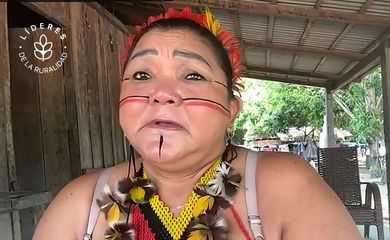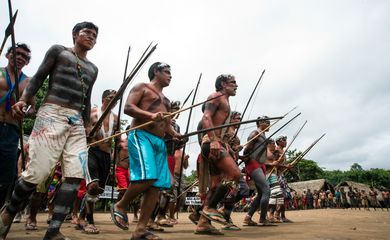Pardon request for indigenous people victims of dictatorship approved

For the first time since its establishment in November 2002, the Brazilian Amnesty Commission has approved a request for collective reparations for serious violations of the rights of indigenous communities during the military regime (1964-1985).

In addition to acknowledging the severe consequences of state action and inaction against members of the Krenak and Guarani-Kaiowá ethnic groups, the collegiate body agreed to issue a formal apology on behalf of the Brazilian state. They also approved a set of recommendations for implementation by public bodies to prevent a recurrence.
"I would like to kneel before you. I am deeply moved. On behalf of Brazil and the Brazilian state, I want to apologize. Please convey this apology to all your people, on behalf of the Amnesty Commission and the Brazilian state," said the commission's president, lawyer Enéa de Stutz e Almeida, as she knelt before the representative of the Guarani-Kaiowá community. Their request for reparations was the second to be judged and approved on Tuesday (Apr. 2). Enéa de Stutz e Almeida repeated the gesture in front of the representative of the Krenak community.
Operating under the Ministry of Human Rights and Citizenship, the Amnesty Commission is tasked with reviewing cases of amnesty stemming from state political persecution between September 1946 and October 1988. Last year, the members of the board approved changes to its internal regulations, enabling the submission of collective amnesty applications. The requests from the Krenak and Guarani-Kaiowá communities mark the first such judgments in the country's history.
"We debated extensively and, with the input of many individuals beyond the commission's board, we concluded that, concerning indigenous peoples, individual applications do not hold much relevance. What is meaningful for these communities is precisely collective reparation," explained the commission's chairwoman.
In the requests submitted to the commission, the Federal Public Prosecutor's Office argues that from 1957 to 1980, indigenous peoples across Brazil, not just the Krenak and Guarani-Kaiowá communities, were subjected to government and business interventions in their territories. These actions led to deaths, violations of physical integrity, and the profound disintegration of their traditional ways of life.
In its 2014 final report on human rights violations committed during Brazil's last civil-military dictatorship, the National Truth Commission highlighted that at least 8,350 indigenous people were murdered, and many others endured various forms of violence and abuse. Additionally, as far back as 1968, the Figueiredo Report, a comprehensive document commissioned by the now-defunct Ministry of the Interior of the military government, detailed a series of barbaric crimes committed against indigenous peoples.
"Their rights were violated, concerning both their lands and their freedoms. The military governments showed a pattern of disregarding indigenous institutions and systematically displacing them from their traditional territories, leading to the vulnerability and biological and cultural devastation of their communities," added the rapporteur of the Krenak amnesty application, Councillor Leonardo Kauer Zinn. He believes that "the actions of the military dictatorship led to the social and cultural disintegration of the Krenak people."
Reparations
In the case of collective applications, the recognition of amnesty requests does not include economic reparations. Joenia Wapichana, the president of the national indigenous authority Funai, who attended the trial in person, views the decision as an important step in recovering the memory of events that are still relatively unknown.
"Memory is very important for indigenous peoples. Thanks to it, we know where we came from and where we want to go. It is not simply erased. It is used to correct mistakes and get things right, especially in the administration of a country. Making this memory public is essential. For us, indigenous peoples and for Funai, visibility is crucial. Not just in reports because we know there was a lot of violence, but also in terms of reparations and public policies," commented Wapichana, adding that "all indigenous peoples deserve justice."




